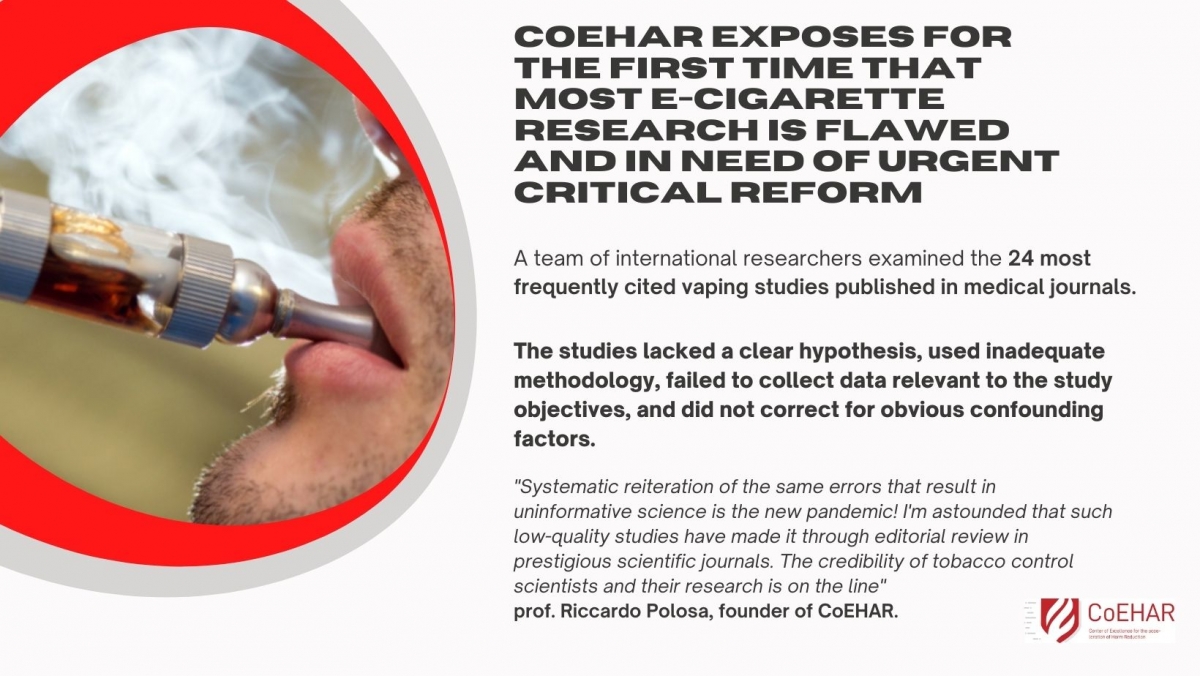Under the leadership of CoEHAR, a team of international researchers, examined the 24 most frequently cited vaping studies published in medical journals. The findings are shocking: almost all of these studies were found to be methodologically flawed; they lacked a clear hypothesis, used inadequate methodology, failed to collect data relevant to the study objectives, and did not correct for obvious confounding factors.
“The findings are shocking: almost all of these studies were found to be methodologically flawed” – CoEHAR

They say a group of international experts collaborated with scientists from CoEHAR to publish an in-depth critical evaluation of the most widely quoted e-cigarette research studies. The research paper titled "Analysis of common methodological flaws in e-cigarette epidemiology research," published in Internal and Emergency Medicine journal, exposes the most common errors researchers have made when looking into the health impact of combustion-free nicotine delivery products.
Under the guidance of Dr Cother Hajat of the United Arab Emirates University and Professor Riccardo Polosa, founder of the CoEHAR, the study's researchers analysed the 24 most popular vaping studies published in highly authoritative medical journals. The researchers noted a plethora of fatal flaws in these studies; they identified, categorised, and accurately analysed each mistake.
The authors conclude that the most influential research on e-cigarette is of inadequate quality and insufficient to guide public health decision and they offer practical recommendation for improving research in this field.
Dr Hajat said: “Most of the included studies utilised inappropriate study design and did not address the research question that they set out to answer. In our paper we offer practical recommendations that can massively improve the quality and rigor future research in the field of tobacco harm reduction.”
Professor Polosa added: “Systematic reiteration of the same errors that result in uninformative science is the new pandemic! I'm astounded that such low-quality studies have made it through editorial review in prestigious scientific journals. The credibility of tobacco control scientists and their research is on the line.”
This investigator-initiated study was sponsored by ECLAT srl, a spin-off of the University of Catania, with the help of a grant from the Foundation for a Smoke-Free World Inc.
Dave Cross
Journalist at POTVDave is a freelance writer; with articles on music, motorbikes, football, pop-science, vaping and tobacco harm reduction in Sounds, Melody Maker, UBG, AWoL, Bike, When Saturday Comes, Vape News Magazine, and syndicated across the Johnston Press group. He was published in an anthology of “Greatest Football Writing”, but still believes this was a mistake. Dave contributes sketches to comedy shows and used to co-host a radio sketch show. He’s worked with numerous start-ups to develop content for their websites.
Join the discussion
Parliament Fears Two
The Department for Environment, Food and Rural Affairs faced questions from a Conservative MP and, oddly, a member of the Department for Environment, Food and Rural Affairs
Harm Reduction For The Rich
The United Kingdom risks becoming a harm reduction country only for the wealthy, according to Michael Landl of the World Vapers’ Alliance
Sacrificing Health For 2p Cut
Tory Government alienates vaping voters with its mission to cut tax by an unaffordable 2p to attract voters by placing a tax on vape products in the forthcoming budget
Scotland Announces Single-Use Vape Action
A ban on the sale and supply of single-use vapes in Scotland is due to come into effect on 1 April 2025, under proposed legislation published today






-listing400.jpg)




